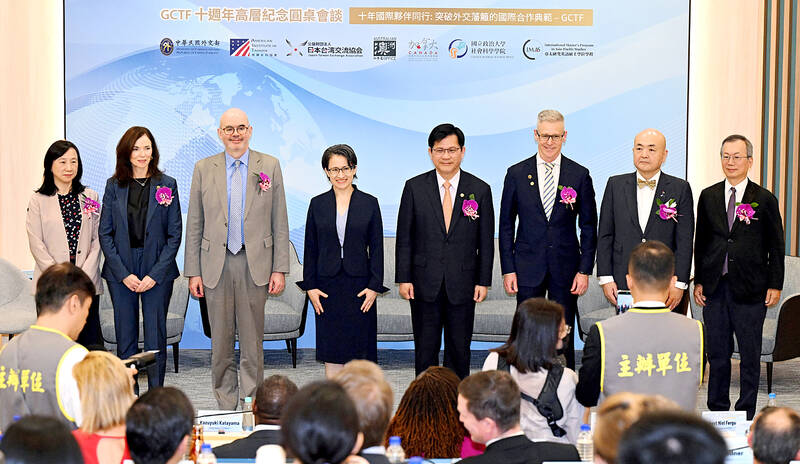Vice President Hsiao Bi-khim (蕭美琴) yesterday emphasized Taiwan’s commitment to help democracies confront global challenges, despite China’s efforts to interfere with the nation’s participation in international affairs.
She made the remarks at the Global Cooperation and Training Framework’s committee meeting.
Taiwan and the US in 2016 established the framework so that like-minded countries could address shared concerns over cybersecurity, public health, humanitarian aid, disaster relief, energy, supply chain resilience and media literacy, among other issues.

Photo: Liao Cheng-hui, Taipei Times
The organization has 135 participating nations, and more than 10,000 people have taken part in its proceedings.
Taiwan, which played a part in creating the framework, is glad to see it has grown into a vibrant platform that unites nations and people through democratic values and common goals, Hsiao said.
She also thanked American Institute in Taiwan Director Raymond Greene and other foreign envoys to Taiwan present at the meeting.
That Greene attended the event in the middle of a US government shutdown displayed Washington’s resolve and committeement to a free, open and rules-based global order, she said.
Japan provided humanitarian relief to Taiwan during Typhoon Ragasa and displayed outstanding leadership in dealing with maritime affairs, Australia made significant contributions to energy transition and sustainability, and Canada has injected the framework with new capabilities, Hsiao said.
“No nation could stand alone” amid the risks from pandemics, supply chain disruptions, climate change, technological transformation and rising geopolitical tensions, she added.
Cooperation based on trust and shared values is the only foundation for defending lasting peace and prosperity, she said.
Taiwanese feel deeply about the unfair treatment their nation faces in the global community, but would never allow it to color their readiness to be a positive force for good in the world, Hsiao said.
Taiwan can be of help and is helping through partnership networks, she said, adding that the nation has proved itself to be a trustworthy, reliable and active member of the global democratic community.
The framework would continue to evolve by deepening collaboration between members in matters related to artificial intelligence governance, supply chain security, energy transformation and disaster relief, Hsiao said.
Humanitarian aid and emergency responses are likely to become especially important missions for the framework, as nations across the world reel under the impact of extreme climate events, she added.

ALIGNED THINKING: Taiwan and Japan have a mutual interest in trade, culture and engineering, and can work together for stability, Cho Jung-tai said Taiwan and Japan are two like-minded countries willing to work together to form a “safety barrier” in the Indo-Pacific region, Premier Cho Jung-tai (卓榮泰) yesterday said at the opening ceremony of the 35th Taiwan-Japan Modern Engineering and Technology Symposium in Taipei. Taiwan and Japan are close geographically and closer emotionally, he added. Citing the overflowing of a barrier lake in the Mataian River (馬太鞍溪) in September, Cho said the submersible water level sensors given by Japan during the disaster helped Taiwan monitor the lake’s water levels more accurately. Japan also provided a lot of vaccines early in the outbreak of the COVID-19 pandemic,

Kaohsiung Mayor Chen Chi-mai (陳其邁) on Monday announced light shows and themed traffic lights to welcome fans of South Korean pop group Twice to the port city. The group is to play Kaohsiung on Saturday as part of its “This Is For” world tour. It would be the group’s first performance in Taiwan since its debut 10 years ago. The all-female group consists of five South Koreans, three Japanese and Tainan’s Chou Tzu-yu (周子瑜), the first Taiwan-born and raised member of a South Korean girl group. To promote the group’s arrival, the city has been holding a series of events, including a pop-up

The Ministry of Foreign Affairs (MOFA) yesterday voiced dissatisfaction with the Comprehensive and Progressive Agreement for Trans- Pacific Partnership (CPTPP), whose latest meeting, concluded earlier the same day, appeared not to address the country’s application. In a statement, MOFA said the CPTPP commission had "once again failed to fairly process Taiwan’s application," attributing the inaction to the bloc’s "succumbing to political pressure," without elaborating. Taiwan submitted its CPTPP application under the name "Separate Customs Territory of Taiwan, Penghu, Kinmen and Matsu" on Sept. 22, 2021 -- less than a week after China

TEMPORAL/SPIRITUAL: Beijing’s claim that the next Buddhist leader must come from China is a heavy-handed political maneuver that will fall flat-faced, experts said China’s requirement that the Dalai Lama’s reincarnation to be born in China and approved by Beijing has drawn criticism, with experts at a forum in Taipei yesterday saying that if Beijing were to put forth its own Dalai Lama, the person would not be recognized by the Tibetan Buddhist community. The experts made a remarks at the two-day forum hosted by the Tibet Religious Foundation of His Holiness the Dalai Lama titled: “The Snow Land Forum: Finding Common Ground on Tibet.” China says it has the right to determine the Dalai Lama’s reincarnation, as it claims sovereignty over Tibet since ancient times,